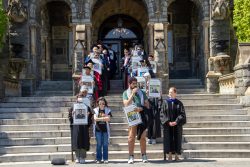Georgetown University caught a financial break last month when the D.C. Council approved its request for $90 million in tax-exempt bonds, most of which will fund the new Science Center. But the Council’s hearing also prompted some unexpected news, when Councilmember Mary Cheh (D-Ward 3) used it to float the idea of implementing a Payment-in-Lieu-of-Taxes system for large nonprofits in D.C.
Cheh argues that since nonprofits like Georgetown, which do not pay property taxes, can get favorable bond rates thanks to the District’s strong credit rating, they should be obligated to give back to the city. A PILOT program, in which nonprofits partially compensate local governments for lost property tax revenue, would be an ideal way to correct the imbalance and help with the city’s budget woes. Although Cheh’s Chief of Staff David Zvenyach said there is not enough time to implement a PILOT program that would help plug this fiscal year’s $188 million budget gap, it could be a useful way to help conquer the city’s projected $440 million shortfall for fiscal year 2012.
D.C. is stuck in a no-win tax situation. Maryland and Virginia residents who work in the District pay income taxes in their home states, eliminating a huge source of potential revenue and forcing the District to rely on property taxes. But the city’s 3,000 nonprofit organizations, coupled with land owned by tax-exempt federal or foreign governments, limit the D.C. government’s property tax revenue.
According to a recent study from the Lincoln Institute of Land Policy, PILOTs are most appropriate for municipalities that rely on property tax revenue and have a significant share of property owned by nonprofits. Although the program can’t solve this fiscal year’s deficit, Cheh was wise to raise the issue. As congressional Republicans threaten strict control over city affairs, the need to find new revenue sources is particularly acute.
D.C. universities have never been subject to PILOTs, but Cheh’s proposal could find support from other local leaders. Alice Rivlin, a visiting professor at Georgetown who is currently advising Mayor-elect Vincent Gray (D), lobbied for a PILOT program in the dark economic days of the early ‘90s. D.C. Chief Financial Officer Natwar Gandhi also has a history of supporting PILOTs. In 2002, he successfully extracted contributions from the AARP and the National Education Association.
But while a PILOT program is an attractive option to the cash-strapped legislators, it won’t be as popular among nonprofits. The Center for Association Leadership has criticized the PILOT model as “a tax by another name on tax-exempt entities” that “hurts many nonprofits’ ability to carry out their tax-exempt purpose.” No D.C. universities have publicly commented on Cheh’s tentative proposal, but American University President Neil Kerwin defended his school’s tax-exempt status earlier this year, telling the Northwest Current, “AU provides many in-kind services, including tutoring and peace-and-conflict resolution training throughout the city.”
While educational institutions and other nonprofits deserve credit for the contributions they make to D.C., they do little to help address the city’s budget deficit. A PILOT is not a silver bullet, but it will help bridge the gap without overburdening nonprofits. According to The Center for Association Leadership, Cheh has suggested charging local universities $100 per student per semester. For Georgetown’s main campus, this would generate approximately $1.25 million in PILOT fees per year. That seems pretty steep—until you consider the $14 million the city would make in annual property taxes if Georgetown were not a nonprofit.
Georgetown and other universities couldn’t carry out their educational missions while paying such steep rates, but they have an obligation to help D.C. recoup its lost property tax revenue. Considering the upcoming fiscal year’ budget crisis, local universities and other large non-profits should cooperate with government officials to find a fair way to meet their neighborly responsibilities.
Want to know if Juliana’s PILOT program flies like a G-6? Email her at jbrint@georgetownvoice.com





$1.25M might not sound like much, but it would $1.25M less spent on something else. Budgeting is a zero-sum game. You can only go so far into debt. The idea that “While educational institutions and other nonprofits deserve credit for the contributions they make to D.C., they do little to help address the city’s budget deficit” is ludicrous. Students, faculty, staff, and visitors to GU bring millions in tax revenue to the city through sales tax, gas tax, higher property taxes paid by homeowners who rent their property (sorry neighbors), and purchasing property when they come to work here (just to name a few). Further, because GU has both a police and ambulance service, they burden some city services less than other businesses might. If Universities were forced to pay this PILOT, it would behoove them to cut specifically an equal number of services that would have a direct impact on the DC budget. For example, stop SNAP and the MPD detail and have all off campus issues handled by MPD. Or, CSJ could stop doing all of their programs and DC could worry about services to underserved kids. How about we get rid of GERMS and only call 911? (No offense to GERMS…they rock!) GERMS who, by the way, provides free service to the surrounding community…nope…gonna have to stop doing that.
If DC wants to recoup money, they should go after non-profits and religious organizations that claim to be non-political but clearly are not. Political organizations shouldn’t be tax exempt.